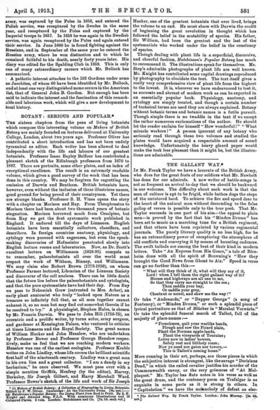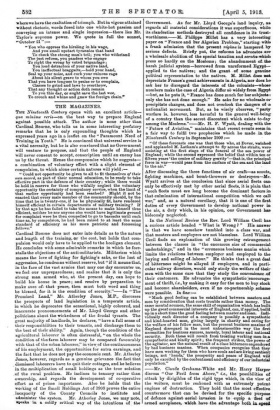THE GALLANT WAY.* IN Mr. Frank Taylor we have a
laureate of the British Army, who dces for the great feats of our soldiers what Mr. Newbolt has done for our admirals. A_ new writer of battle-songs is not so frequent an arrival to-day that we should be backward in our welcome. The difficulty about such work is that the man of culture is apt to be frigid, while bathos dogs the steps of the untutored bard. To achieve the fire and speed dear to the heart of the natural man without descending to the false gallop of verses is possible only to the true poet. That Mr. Taylor succeeds in one part of his aim—the appeal to plain men—is proved by the fact that his "Minden Drums" has been set to music as a marching tune for a British regiment, and that others have been reprinted by various regimental journals. The purely literary quality is no less high, for he has an extraordinary power of recapturing the atmosphere of old conflicts and conveying it by means of haunting cadences. The swift ballads are among the best of their kind in modern letters. Take "An Express from His Grace," a tale of Blen- heim done with all the spirit of Browning's "How they brought the Good News from Ghent to Aix." Speed in verse can go no further than this :—
" What will they think of it, what will they say of it,
Lord ! when I tell them the right gallant way of it P Horses and highways are all one to me, So that they carry me straight to the sea; Then saddle your bay, Or saddle your grey,
Chestnut or sorrel, and show me the way!"
Or take " Audenarde," or "Dapper George" (a song of Fontenoy), or "Minden Drums," or such a splendid piece of lyrical portraiture as that of Blucher in "Marshal Vorwarts."
Or take the splendid funeral march of Talbot, full of the majesty of place-names :— "Frenchmen, quit your warlike bands,
Plough and sow the Picard plain, Plant the Norman apple-lands,
Plant the vineyards of Touraine; Loiter now in ladies' bowers,
Safely rest and blithely roam; Now ye need nor gates nor towers,— This is Talbot's coming home."
More cunning in their art, perhaps, are those pieces in which the subjective interest is strongest, like the savage "Dorislaus Dead," in which the exiled cavalier justifies his murder of the Commonwealth envoy, or the eery grimness of "At Mal- plaquet." Mr. Taylor has flute notes in his verse as well as the great drum, and the centenary poem on Trafalgar is as exquisite in some parts as it is strong in others. In " Capitulation " we have the melancholy of defeat as else-
• The Gallant Way. By Frank Taylor. London: John Murray.. [2s. 6d. net.]
where we have the exaltation of triumph. But in vigour attained without rhetoric, words fused into one white-hot passion and conveying an intense and single impression—there lies Mr. Taylor's supreme power. We quote in full the sonnet, "October 21" :—
"Yoa who oppress the hireling in his wage,
And you small upstart tyrannies that band To check the strong man's toil; you who withstand The just reform, you panders -who engage To right the wrong by voted brigandage ; You loud detractors of your native land, You ineffectual braggarts,—hold your hand, Seal up your noise, and curb your ruinous rage About his silent grave to whom you owe That you have tongues to praise or -to complain, Classes to grind and laws to overthrow, That any thought or action doth remain To you this day, or aught save the last woe, To crouch and whine and gnaw the foreign chain."















































 Previous page
Previous page